13 Plastic-Free Coffee Makers For A Healthy, Home Brew
Fancy an oat milk latte with a splash of phthalates and an extra shot of BPA?
Probably not—and neither does the planet.
Plastic-free coffee makers ensure those phthalates and BPAs stay out of your morning brew, while still allowing you to take sips towards a zero waste coffee routine.
But are all coffee makers plastic on the inside?
Not at all! While legitimate eco-options are still few in this space, there are brands that percolate to the top of our list, offering coffee brews that are a little better for us and our planet.
So what is the most non-toxic coffee maker?
Everything we recommend to you on Sustainable Jungle is independently researched and we ask all brands to confirm their claims. To avoid waste, we test products on an as needed basis. This post contains affiliate links. If you buy something through our links, we may earn a small commission. Learn more about why we do this here.
The Best Non-Toxic Coffee Maker Brands We Have A Whole Latte Love For
Pure Over crafts a 100% plastic-free coffee maker without filter requirements that enhances your coffee’s natural flavors. The all-glass design not only creates a sleek aesthetic but also ensures that your brew is free from any unwanted flavors or toxins, making every cup a pure (over) delight.
When it comes to a coffee maker with no plastic parts, Hario excels. Their V60 Olive Wood Pour Over Stand Set is an eco coffee maker featuring heatproof glass and a non-toxic silicone seal to ensure a clean and perfect brew.
Coletti delivers a durable plastic-free coffee percolator and no plastic french press crafted from robust AISI 304 stainless steel. Each piece is designed to last a lifetime, promising an eco-friendly option that brews a perfect, toxin-free cup every time.
Now pop-on your eco kettle, and sit back and relax as we explore some other plastic-free coffee makers.
And if your sustainable coffee is turning into cold brew, head to the end of the article to see what it means to be a healthy coffee maker and how we chose these caffeine loving contraptions, or watch our video below.
The Full List Of Plastic-Free Coffee Makers
- Pure Over | Visit Store
- Coletti | Visit Store
- Hario | Visit Store
- Mueller | Visit Store
- DreHomeCrafts | Visit Store
- SMEG | Visit Store
- ROK | Visit Store
- illy | Visit Store
- Vintage Coffee Makers | Visit Store
- Canadiano | Visit Store
- Lindy’s | Visit Store
- AeroPress | Visit Store
- Ovalware | Visit Store
1. Pure Over
About Pure Over’s Plastic-Free Pour Over Coffee Maker
Price Range: $36–$92
What is the best non-toxic pour over coffee maker?
That’s as easy to answer as Pure Over makes brewing coffee.
Say goodbye to the blandness brought on by plastic and paper filters. Their all-glass coffee maker is here to elevate your caffeine game.
This elegant, contemporary brewer is crafted entirely from durable and temperature resistant borosilicate glass, guaranteeing a cup of joe that’s untainted and utterly delightful.
The only non-glass component is the ceramic coaster and drip tray, all of which are dishwasher safe.
We like our coffee like we like our minimalist wardrobe—all black and earthy, no sustainable milk alternatives or sugar, please.
So we personally love the simplicity and statement-making minimalist style of Pure Over’s all-glass architecture that isn’t just about aesthetics—it’s a practical choice that’s ridiculously easy to clean and maintain. No filters, no moving parts, now brewing in excess.
Plus, once you figure out how many scoops of coarse coffee grounds you prefer, you can get a consistently fresh and delectable coffee, every single time.
Because we try to control our caffeine consumption, we use their non-toxic single serve coffee maker, but the Brew Kit XL is perfect for sharing or ensuring you have a second cup waiting. Thought note the glass doesn’t keep coffee hot for too long, so you’ll need to be a speedy sipper.
For anyone seeking a sustainable, authentic, and downright exquisite coffee experience this is one of the best plastic-free coffee makers out there.
Pure Over’s Ethical & Sustainability Practices
PureOver isn’t just a win for coffee aficionados; it’s a triumph for sustainable choices, thanks to an unwavering in their commitment to high-quality, eco-conscious products.
In addition to esiging long-lasting, simple products that will outlast trends, they also donate a portion of profits to the Crucible community and purpose with classes taught by their founder, Etai Rahmil.
2. Coletti
Coletti‘s Non-Toxic Coffee Maker
Price Range: $37–$100
You won’t find any plastic or glass in Coletti’s range of French press and percolator coffee makers—meaning no toxins!
Instead, they’re made of AISI 304 stainless steel (the same material used in building construction).
That means these plastic-free stainless steel coffee makers are designed for durability and adventuring and the French press keeps coffee hot for 4+ hours.
They can be used to make cold brew, too.
Coletti‘s Ethical & Sustainability Practices
All Coletti products are backed by a lifetime replacement guarantee.
The company is veteran-owned and operated and they donate 10% of profits to charities working to spread Christian dialogue in countries where religious freedom is lacking.
3. Hario
Hario‘s Non-Toxic Pour Over Coffee Maker
Price Range: $40–$220
If you have clumsy pre-caffeine hands (not so much post-caffeine shakes), the V60 Olive Wood Pour Over Stand Set from Hario holds the coffee dripper, so you don’t have to worry about breakages.
The no plastic drip coffee maker including the dripper itself, server, and lid are all made with heat proof glass.
Even the sealant on the glass lid is free of plastic and made with silicone rubber.
Plus, it looks so elegant and classic that it’ll easily complement just about any interior decor scheme.
The kit does come with natural brown paper filters that can be tossed in your indoor compost bin along with the grounds, but CoffeeSock has a reusable GOTS-certified organic cotton filter that’s designed to fit.
Hario‘s Ethical & Sustainability Practices
Since 1972, Hario’s factory has been making glass with electricity, an environmentally friendly alternative to combustion smokestacks.
It’s produced using a low-pollutant natural gas. Any excess glass material is returned to the furnace for reuse.
The Japanese company is also working to increase the number of women in managerial positions and participates in regular local philanthropic clean-ups.
4. Mueller
Mueller‘s Small Plastic-Free Coffee Maker
Price Range: $15–$60
Mueller’s French press aluminum plastic-free coffee maker is made with double insulated 304 stainless steel.
It also features a 4-level filtration system, keeping those grounds out of your cup.
The perfect eco-friendly travel product, it even comes with a travel canister to keep beans or grounds fresh while you’re on-the-go.
Dishwasher safe and rust-free, this plastic-free coffee maker is ready to fuel your caffeine addiction, time and time again.
Mueller‘s Ethical & Sustainability PracticesMueller donates a percentage of every purchase to the Youth Opportunity Center, which helps youth and families in crisis situations get back on their feet.
5. DreHomeCrafts
DreHomeCraft‘s Best Plastic-Free Pour Over Coffee Maker
Price Range: $19–$47
With two glass and wood pour over sets, DreHomeCraft is an Etsy shop made for coffee-lovers.
They both come with a wooden glass dripper and glass pot set.
The dripper is designed for V60 filter paper, but is also compatible with conical-shaped reusable cloth filters.
DreHomeCraft‘s Ethical & Sustainability Practices
DreHomeCraft’s handmade items are produced in China.
They have warehouses in China, France, the UK, and the US to help with local shipping.
6. SMEG
Smeg‘s Non-Toxic Drip Coffee Maker
Price Range: $96–$855
SMEG’s 50’s Retro Style Aesthetic automatic drip coffee maker (or their non-toxic espresso machine if you like your coffee strong) is a blast from the past—and it’s trying to preserve the future.
The almost plastic-free coffee machine has a smaller size than comparable eco-friendly appliances (reducing waste at the end of its life).
“Almost” because it’s darn near impossible to find 100% plastic-free drip coffee makers—at least as far as the current options on the market go.
The housing and carafe are metal and glass, and it comes with a reusable metal mesh filter.
SMEG‘s Ethical & Sustainability Practices
SMEG designs all of their products with our environment in mind.
That’s why they choose materials that are easier to recycle, like steel, aluminum, glass, and brass.
They go above and beyond EU RoHS and REACH directives to minimize use of hazardous materials and chemical substances.
Their Italian manufacturing centers are also backed by ISO 9001, ISO 13485, ISO 14001, and ISO 45001 standards.
SMEG uses renewable energy, recovers or recycles 95% of their waste, and regularly donates to non-profit, health, and voluntary organizations.
7. ROK
ROK‘s Plastic-Free Espresso Machine Without Plastic
Price Range: $10-$480
Hands-up if you can’t do a single thing in the morning until you have your double shot of espresso?
Allow ROK’s non-electric coffee maker to clear your brain fog.
Espresso machines usually don’t come with a lot of plastic, but they are made with a lot of different components that take up landfill space.
Not the barista-quality plastic-free espresso machine from ROK.
The minimal coffee maker is made with cast aluminum, steel, and glass-composite and uses human power (not electricity) to pull a perfect double espresso. The only plastic involved is the heat-resistant handle on the ground basket.
Purchased from ROK, it includes a free glass manual milk frother for your sustainable milk alternative lattes.
For those who like their coffee really fresh, check out the manual coffee grinder. It’s made of the same materials as the espresso press, though it also unfortunately features a plastic base.
ROK‘s Ethical & Sustainability Practices
With no heating element that will eventually wear out, the ROK espresso maker doesn’t just curb plastic waste—it prevents a lot of material from ending up in landfill.
While it’s not a coffee maker with no plastic parts, it’s pretty darn close—and certainly as close as you’ll get among espresso machines.
In fact, this mostly no plastic espresso machine has the smallest carbon footprint in its class and is designed to be anti-obsolescence, complete with a 10-year warranty.
In other words, this is the coffee maker for the rest of your life.
8. Illy
illy‘s Mostly Plastic-Free Pod Coffee Maker
Price Range: $100–$510
Compatible with both ground coffee and pods, the X1 Anniversary from illy blends style with sustainability.
The ‘60s inspired machine is also a good look for our planet.
It’s made with stainless steel and has ECO mode, which uses fast-heating technology to reduce energy consumption.
illy’s E.S.E. coffee pods come in a paper capsule and are certified as 100% compostable (can be disposed of as food waste).
illy‘s Ethical & Sustainability Practices
The Certified B Corp produces as much as possible in Italy. Their manufacturing partners are backed by certifications like ISO 9001, ISO 14001, ISO 45001, and ISO 50001.
Minimal packaging is used and by 2033, illy has plans to be Carbon Neutral.
They’re involved in many philanthropic projects, like supporting Nicaraguan schools, planting native vegetation in Colombia, and supporting Rwandan women.
9. Etsy Vintage Coffee Makers
Etsy’s Low or No Plastic Coffee Makers
Price Range: $15–$160
One of the best places to turn to save money and our planet is Etsy. And their vintage range of plastic-free coffee makers is no different.
Hailing from Italy, VintageAssorty takes coffee enthusiasts back to the 1950s and earlier with their range of stove top percolators, made with aluminum, stainless steel, and even silver and gold.
Similarly, you can bring the magic of an Italian cafe into your kitchen with ItalyVintageDream.
With some coffee makers dating back to the pre-1950s, expect to see materials like aluminum, stainless steel, and porcelain.
Etsy’s Ethical & Sustainability Practices
While each individual seller on Etsy may or may not have their own sustainability practices, we love shopping on Etsy because their site is powered by renewable energy and Etsy sponsors carbon-neutral shipping for all orders on behalf of their sellers.
10. Canadiano
Canadiano’s Plastic-Free Coffee Maker Canada
Price Range: $51-$110
Giving the pour over a planet friendly twist, Canadiano offers one of the most sustainable, zero waste coffee making solutions.
A carved out piece of wood—cherry, ash, and walnut—is combined with an ultra-fine, medical grade stainless steel filter to filter out the grounds.
All pieces use nut oil to extend their longevity. Walnut or safflower oil can be applied as a refinish every 3-4 months.
It doesn’t require replacement filters and the wood is biodegradable at the end of its life.
Canadiano’s Ethical & Sustainability Practices
Canadiano sources their FSC-certified wood locally before it’s manufactured in Toronto.
11. Lindy’s
Lindy’s Plastic-Free Drip Coffee Maker
Price Range: $90
This blast from the past makes coffee the same way your grandparents might have.
Lindy’s drip coffee machine makes 1–10 cups of coffee using water heated on a stovetop or your favorite kettle.
After the water is heated, it can be poured in the top reservoir, where it filters through a stainless steel diffuser plate before being collected in the bottom reservoir equipped with a pour spout.
It’s made with heavy duty 18/10 surgical stainless steel and the only plastic bits are the cool-touch handles, which make it one of the safest coffee makers around.
Lindy’s Ethical & Sustainability Practices
The coffee maker is made in India.
Durable stainless steel is the material of choice, so there’s no reason this non plastic coffee maker shouldn’t last forever.
As long as you can heat water in some way, it can also be used without electricity.
12. AeroPress
AeroPress’ Non-Toxic Coffee Maker In The USA
Price Range: $40–$70
Technically speaking, AeroPress is about as far as you can get from a completely plastic-free coffee maker. It’s made of almost exclusively plastic.
But hear us out—AeroPress is actually one of the few coffee makers that really prioritizes low-waste and non-toxic materials.
The parts of the revolutionary coffee system are made of mostly polypropylene, with a silicone seal on the plunger. They’re all FDA and EU approved for use in contact with food and are BPA and phthalate free.
Polypropylene is used because of its durability and when the silicone plunger seal is removed, all parts are reportedly recyclable (though we’d recommend checking for #5 recycling in your area first).
According to someone’s “showerthought about the Aeropress being plastic” we found out that polypropylene is also made without BPS.
You can opt for traditional paper filters, which are both reusable and compostable, and they also have a Stainless Steel Reusable Filter, too.
AeroPress’ Ethical & Sustainability Practices
AeroPress just requires hot water, coffee, and your hands to make a delicious cup of espresso-like brew.
It’s one of the most low-impact small coffee makers with an equally small footprint, which is why it’s an eco-friendly camping gear staple.
It doesn’t require electricity and there are replacement parts available for all components.
AeroPress coffee makers are entirely made in the USA.
13. Ovalware
Ovalware’s Plastic-Free Cold Brew Coffee Maker
Price Range: $25–$37
Saving time, money, and our planet, the Ovalware cold brew coffee maker is a solid fix if you want a delicious coffee (or iced tea) with minimal effort.
Coarse coffee (or loose leaf zero waste tea) can be added to the medical-grade stainless steel filter then the glass carafe can be filled with cold water and left to brew for 12-24 hours.
No parts of the coffee come into contact with plastic.
The silicon seal is airtight, meaning that the coffee can be stored in a fridge for up to two weeks.
Ovalware’s Ethical & Sustainability Practices
Founded by three brothers, Ovalware is made up of people from diverse backgrounds and cultures, who all share a deep-rooted love for brewing.
They’ve been on a journey towards eco-packaging and the Cold Brew Maker will be the first product shipped with zero plastic.
Did you know we Have a Newsletter?
We cover the latest in sustainable living, fashion, zero waste, beauty, travel, finance and more…
Why Choose Plastic-Free Coffee Makers?
Plastic doesn’t really deserve an invitation to our coffee breaks—yet it’s been RSVPing.
In fact, plastic coffee = toxic coffee.
Many components in a coffee maker are often made with plastic.
This means that each cup likely exposes us to hormone disruptors like BPA and phthalates, which each have their own coffee pot full of potential problems.
The Big Bad BPA
The big problem here is that BPA is known to leach out 55 times faster in hot liquids than it does under normal conditions.
The plastic-hardening chemical has been linked to a range of health concerns, like heart disease, high blood pressure, asthma, diabetes, reproductive disorders, obesity, cancer, and impaired brain development.
Even some “BPA-free” coffee makers should be met with skepticism, because it’s relatively easy to swap out BPA for its toxic chemical cousins, Bisphenol S and Bisphenol F (BPS and BPF).
So are there any coffee makers that are BPA free?
Yes, but unfortunately, many plastic BPA alternatives are structurally similar. So, from a manufacturing standpoint, they make a worthy alternative.
Unfortunately, they’re hormonally active in similar ways, too.
When it comes to estrogenic, antiestrogenic, androgenic, and antiandrogenic hormonal activities, BPS and BPF have been found to be just as potent as BPA as endocrine disruptors.
Phthalate Leaching
Similarly, long-term exposure to phthalate plasticizers adversely influences not just the endocrine system, but also healthy functioning of multiple organs.
The water reservoir, basket, and pipes are often made with hard plastic or PVC, which may leach a variety of phthalates (DMB, DIBM, DEHP).
Phthalates are the world’s most commonly used plasticizers, after all.
Worse, phthalates are more likely than BPA to be leached out by the hot water in a coffee maker.
Chronic exposure to phthalates has been known to adversely impact the endocrine system and healthy organ functioning.
Long-term impacts may include impaired growth and development and compromised reproductive system functioning.
Not only are these plastic based toxins bad from a health perspective, but they can impart that gross plastic-y taste in coffee, too.
Environmental Impact Of Plastic Coffee Machines
BPA in the environment has been known to negatively impact ecosystem health.
Especially since we annually release more than a million pounds of it, in the US alone.
Like many other chemicals, major sinks for BPA include rivers and lakes. Which is why we have a better understanding of BPA impacts on aquatic vertebrates than land-based ones.
Studies have shown that BPA can lead to reproductive and developmental harm and diminished immune function in aquatic non-mammalian vertebrates.
Phthalates are close behind, as they’re produced in very high volumes and are a pervasive toxin in the environment.
They, too, can lead to reproductive toxicity in animals, just as they do in humans.
Not to mention the fact that these plastic-based components are almost always impossible to recycle, and will remain in landfills for hundreds or thousands of years after their last brew session.
Makes you think twice about having that second (or third) cup of coffee, doesn’t it?
How We Found The Best No-Plastic Coffee Makers
To use our favorite coffee analogy again, finding sustainable technology in the world of low impact coffee machines is like finding a green bean in a heap of Arabican roasted beans, pre your 7am caffeine fix.
Making modern coffee machines—like a drip coffee maker or espresso machine, with all their various filters, lids, reservoir tanks, pumps, waterlines, heating elements, pressure gauges, buttons, and switches—often require plastic.
For this reason, many of us have started looking for the best non-toxic coffee maker where hot water and finished coffee don’t come into contact with plastic, or at least only very rarely.
Alternatively, many brands are also now opting for plastic components that are deemed BPA- and/or phthalate free.
So, you’ll see that we’ve filled this list with both zero plastic coffee makers and those with minimal BPA-free plastic components (ideally those that never touch the actual brew itself).
While we obviously prefer coffee makers without plastic of any kind, ultimately your caffeine fix is your choice.
Materials:
The best eco-friendly coffee makers are made with stainless steel, biodegradable wood, or glass.
Stainless steel coffee makers are durable, easy to maintain, resistant to heat, and won’t impart colors or flavors.
Similarly, glass offers many of the same benefits—but we all know how easy it is to break!
Unfortunately, even with glass carafes in a drip coffee machine, the plastic lid and basket may present a risk of BPA/phthalate leaching—so look for those that are explicitly free of these toxins.
Or use filter baskets, interior plumbing components, carafes, and water reservoirs (read; anything that touches water or hot coffee) that are plastic-free.
Because even if a brand claims to make BPA-free coffee makers, it may contain a BPA alternative, like BPF and BPS, which are also known hormone disruptors.
Recyclable aluminum may make for a sustainable coffee maker, but some fear the fact that aluminum is a neurotoxin. While no conclusive evidence exists to suggest it leaches into beverages, it’s something to consider if you’re seeking the healthiest coffee maker available.
- Certifications: Global Organic Textile Standard (GOTS), Forest Stewardship Council (FSC)
Supply chain & labor practices:
Unfortunately, many of these brands are still leaving coffee grounds in our cups. Read: they’re not transparently filtering out some of the unethical aspects of many consumer good supply chains.
It would be great to know more about where and how materials are sourced, and how workers are supported.
- Certifications: Certified B Corporation (B Corp), Restriction of Hazardous Substances in Electrical and Electronic Equipment (RoHS), Registration, Evaluation, Authorisation, and Restriction of Chemicals (REACH), International Organization for Standardization (ISO 9001, ISO 14001, ISO 13485, and ISO 45001)
Energy efficiency:
Manual is the go-to here because unfortunately even the most sustainable coffee machine just isn’t as sustainable as, say, a no plastic French press.
If you can make a cup of coffee or espresso without requiring energy, that’s adv(enti)ageous for our planet.
If energy is required, functions like double-walled insulation or clear-to-read cup measurements can help you minimize the amount of power that’s needed to heat up water and keep it warm.
Recyclability & repairability:
From an end-of-life perspective, small non plastic coffee machines with fewer components are better.
It’s far easier to recycle an all-stainless steel coffee maker (no plastic at all) than an automatic drip coffee maker made with glass, stainless steel, and a batch of other materials.
That morning cup tastes even better when a brand offers repair and replacement part options or lengthy warranties.
How To Dispose Of Coffee Machines
When your trusty eco-friendly coffee machine (or non-eco-friendly one) can brew no more, you may be wondering how to dispose of electronics.
A still-working coffee maker can be donated and many thrift stores, like Goodwill, offer e-waste recycling services for those beyond their last batch.
In the US, Staples recycles coffee brewers (less than 40 lbs).
For UK coffeeholics, Ferrari Espresso recycles non-working coffee machinery and provides you with coffee beans for sending yours in.
After enjoying the final flat white produced by your coffee maker, Australian coffee connoisseurs may have luck by turning to this e-waste recycling service.
An Australian PlanetArk dropoff point may be locally available, too.
Your local government or council may also offer e-waste drops off or collection days.
Final Thoughts On Plastic-Free Coffee Maker Brands
It’s easy to get swept up in the hype of swapping out all your existing homewares for zero waste products.
But the most sustainable caffeine addiction fix is to stick with the coffee maker you already have.
Otherise, checkout secondhand options or maybe a thrift store near you for a pre-loved all-metal coffee maker.
So, let’s keep the buzz around non-plastic coffee makers going so that eventually we can avoid plastic in every sip.
Share this article with fellow coffee lovers you overhear asking, “Are there any coffee makers that don’t use plastic?” so we can all get plastic out of the world’s most consumed beverage.
Pin these:

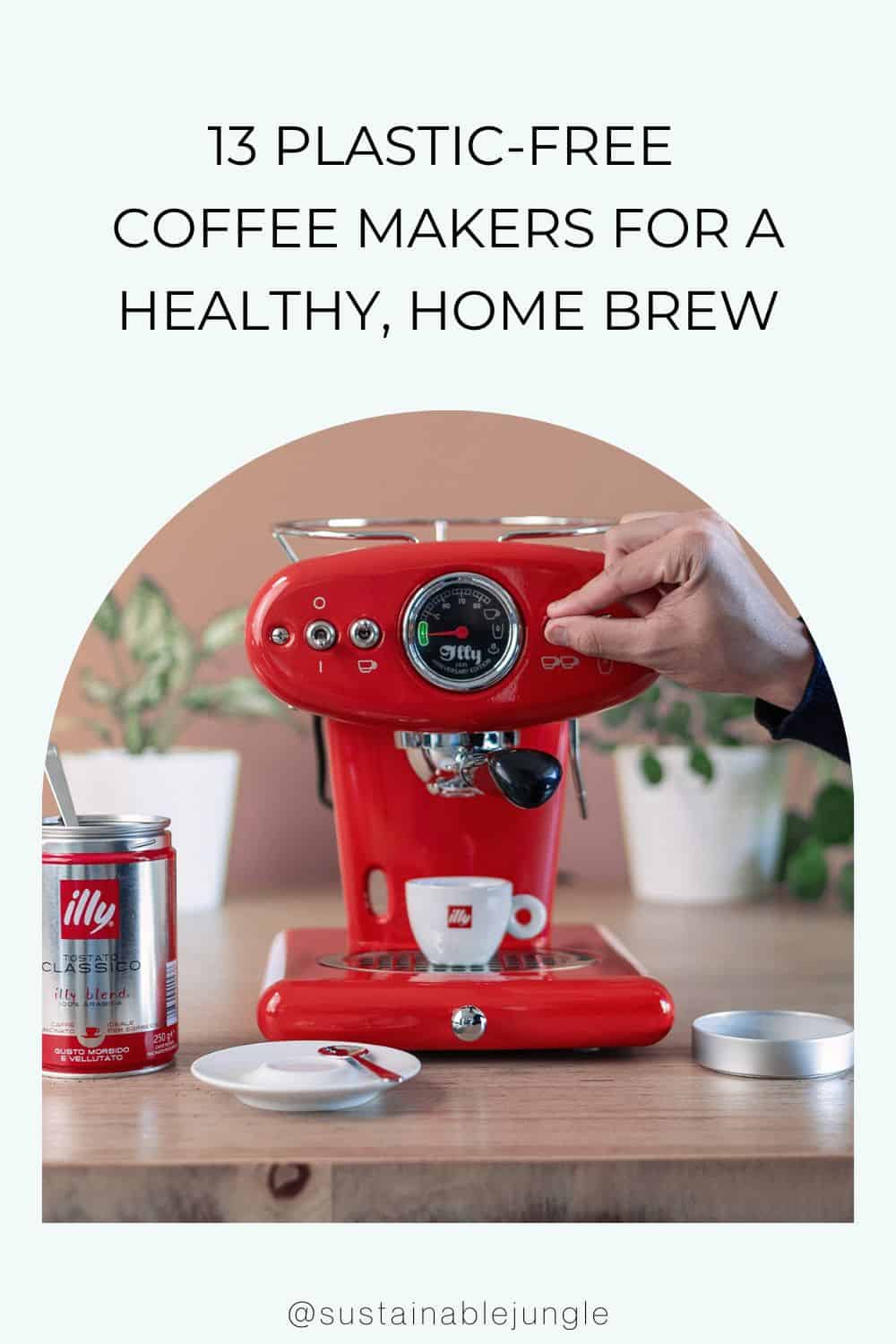

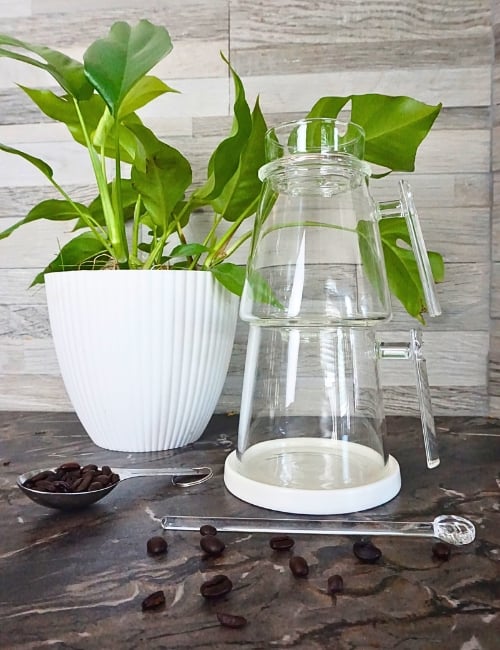
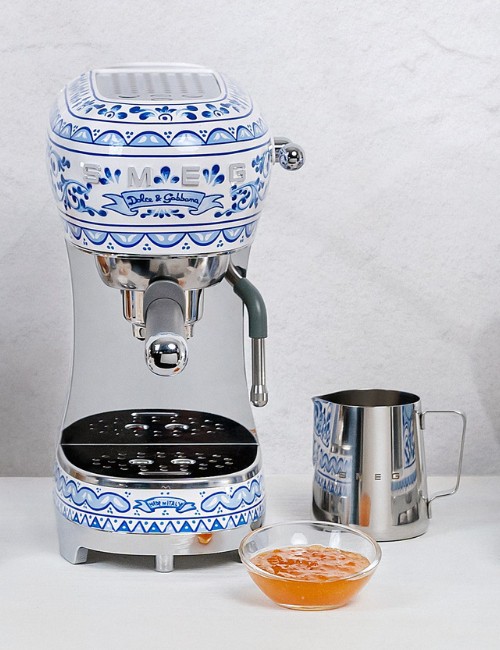
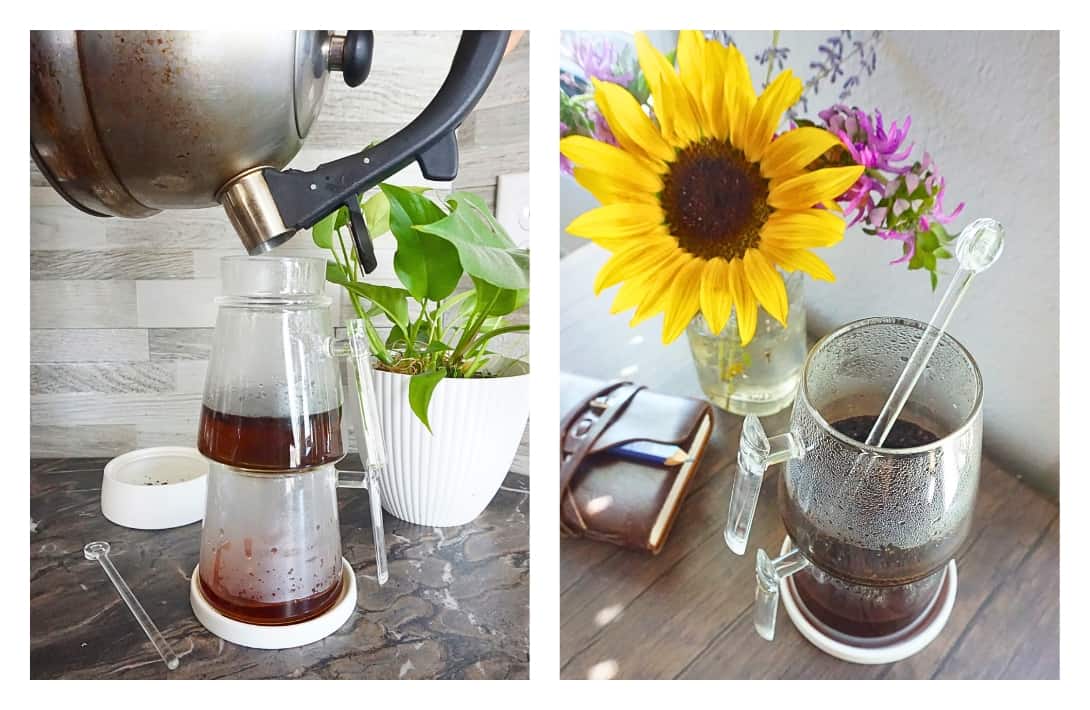
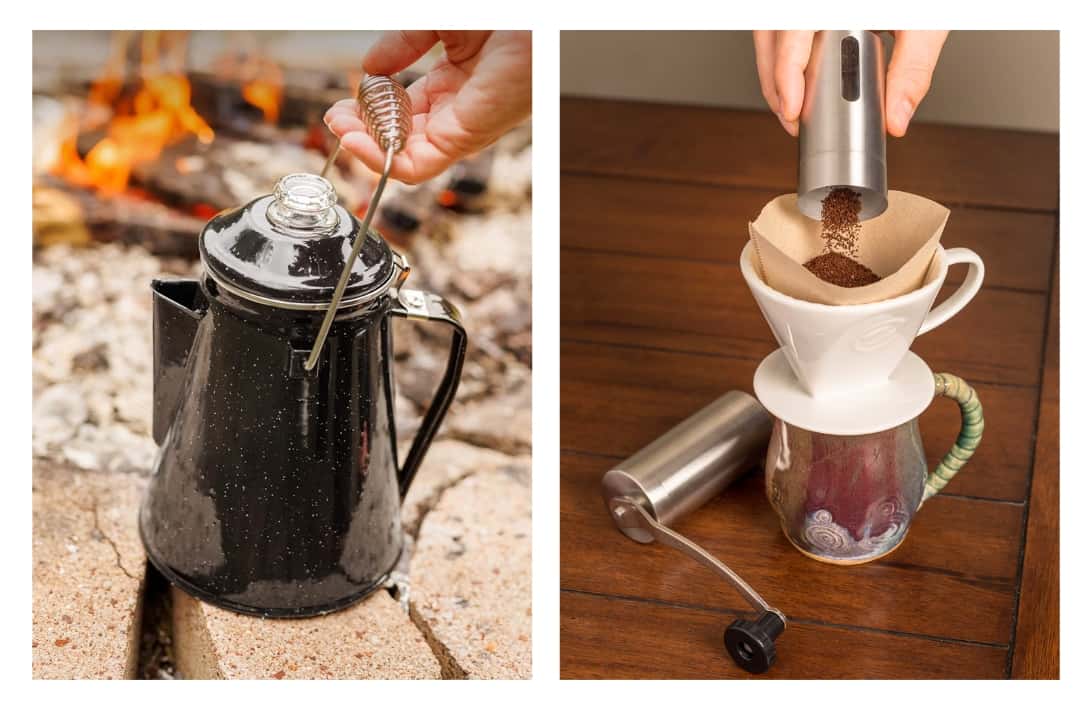
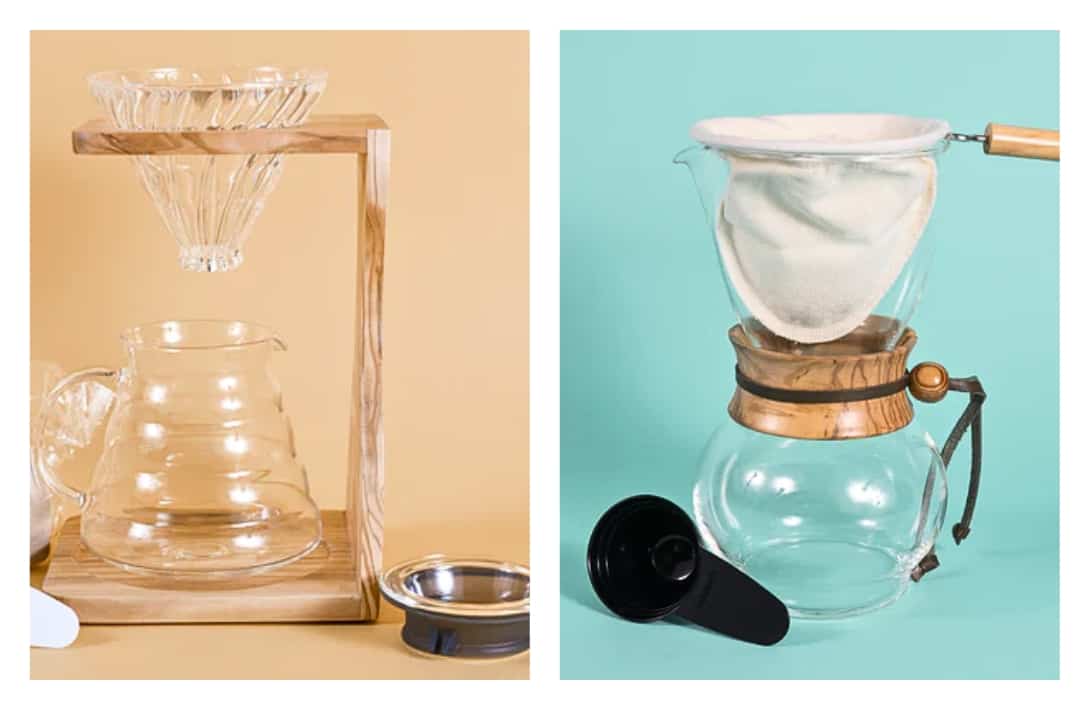
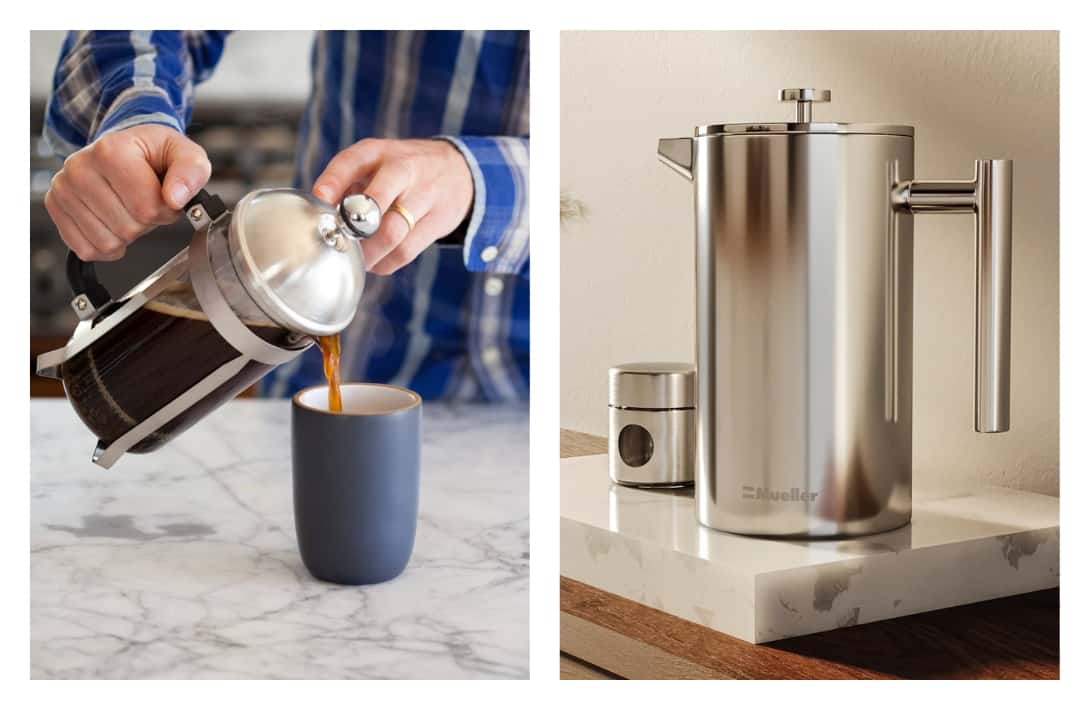
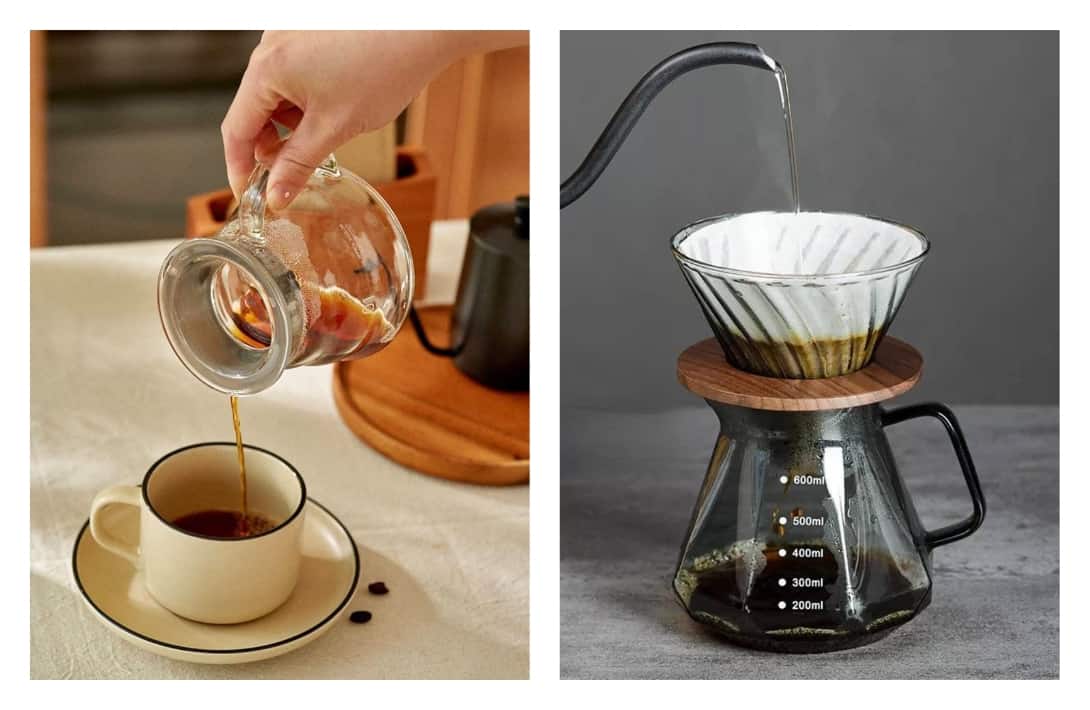
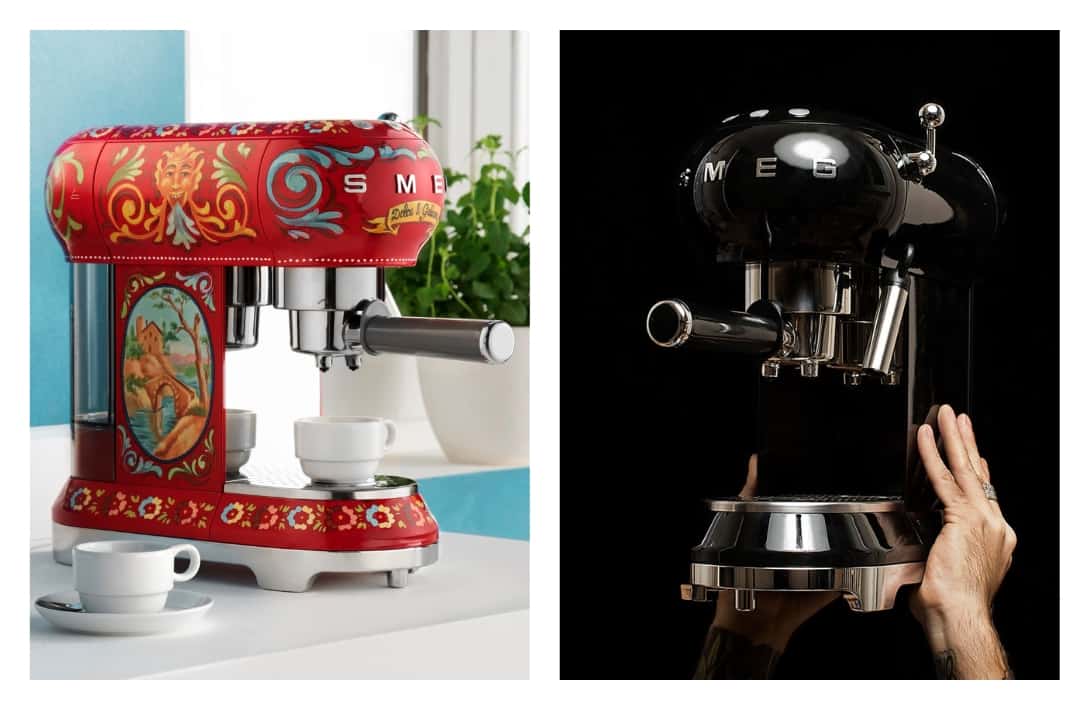
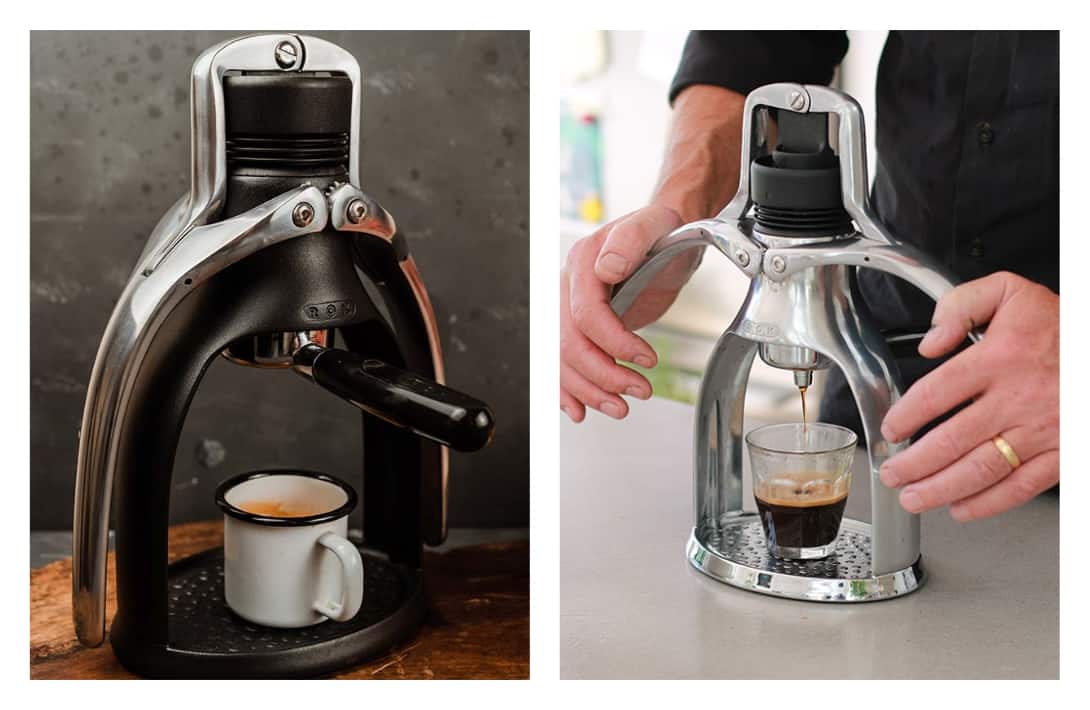
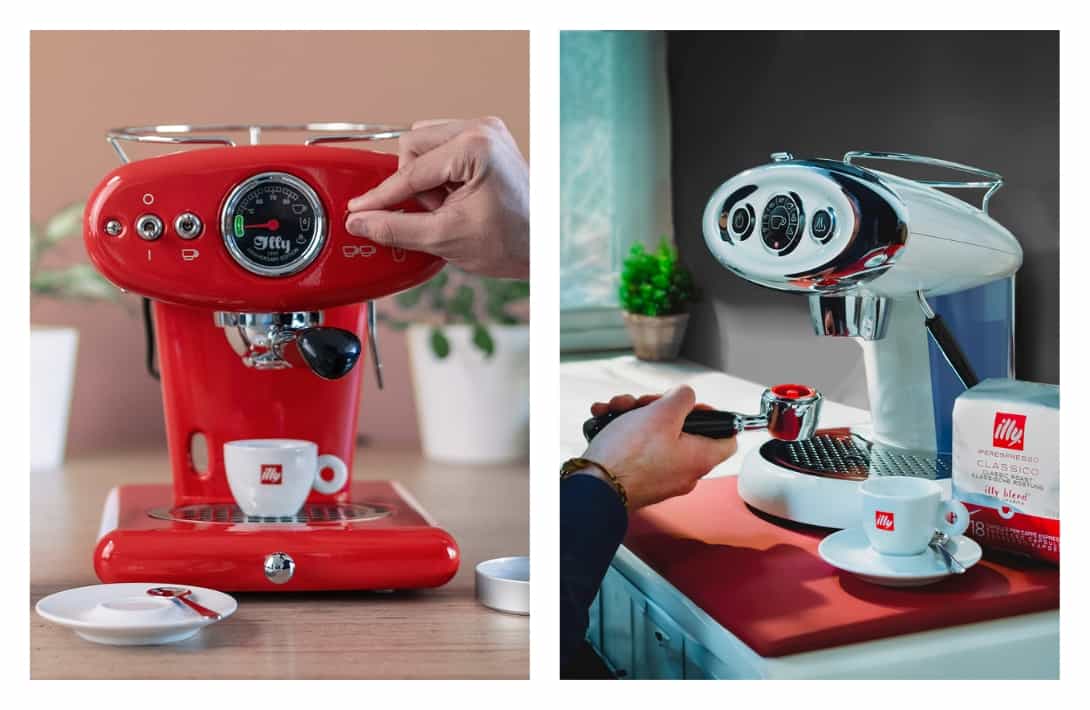
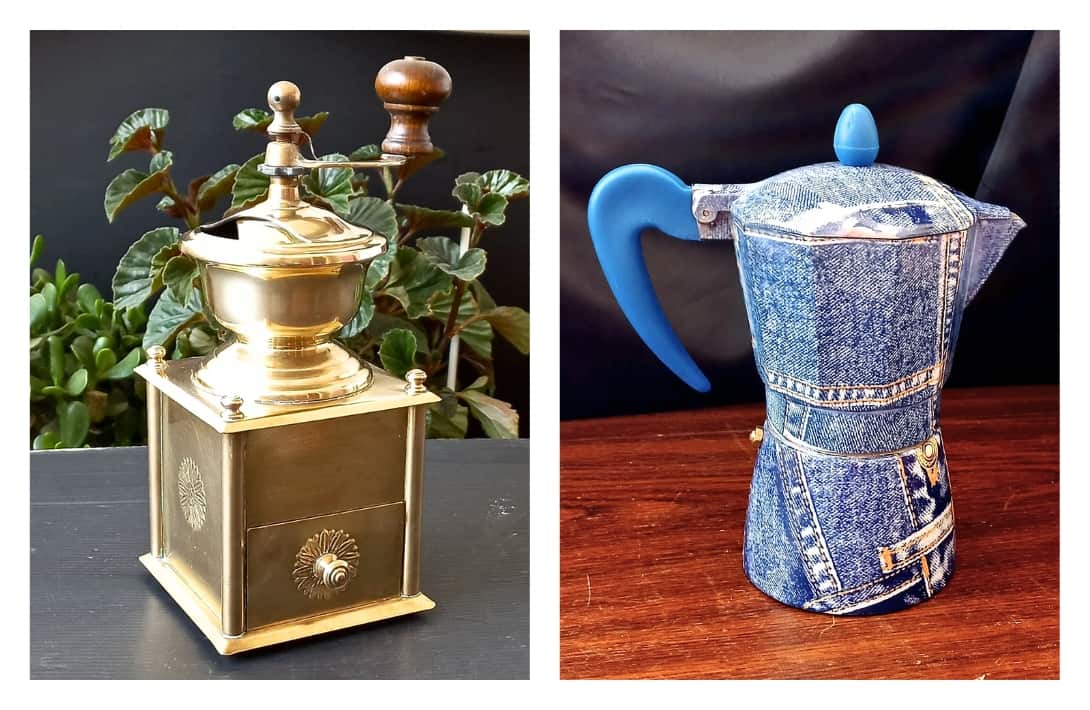
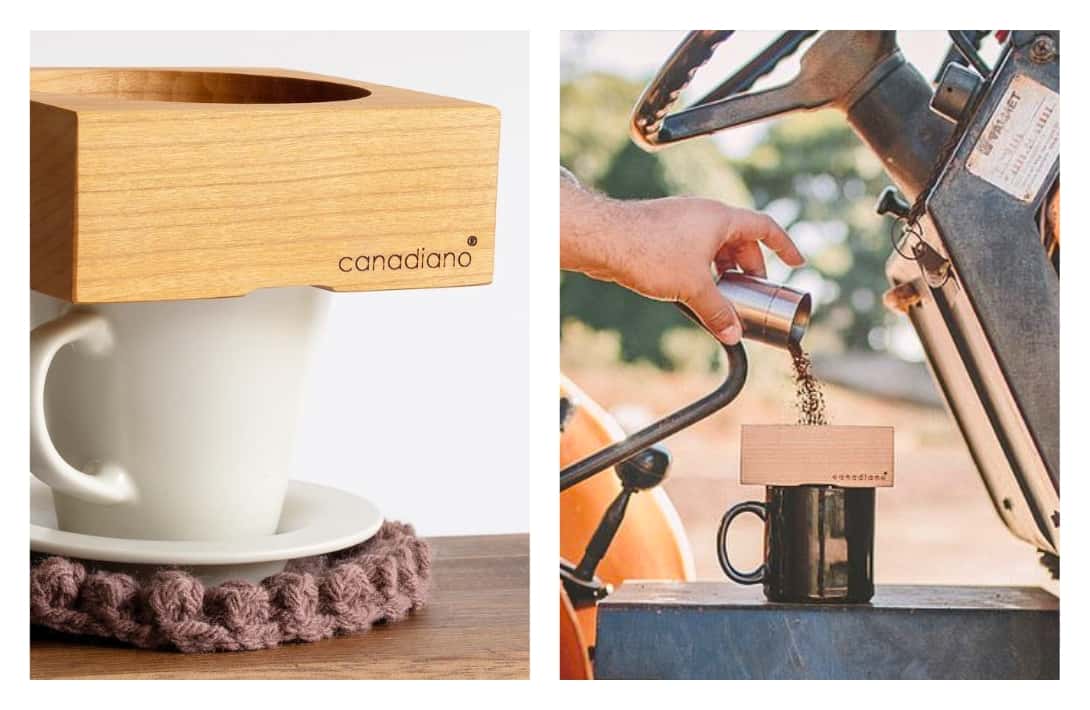
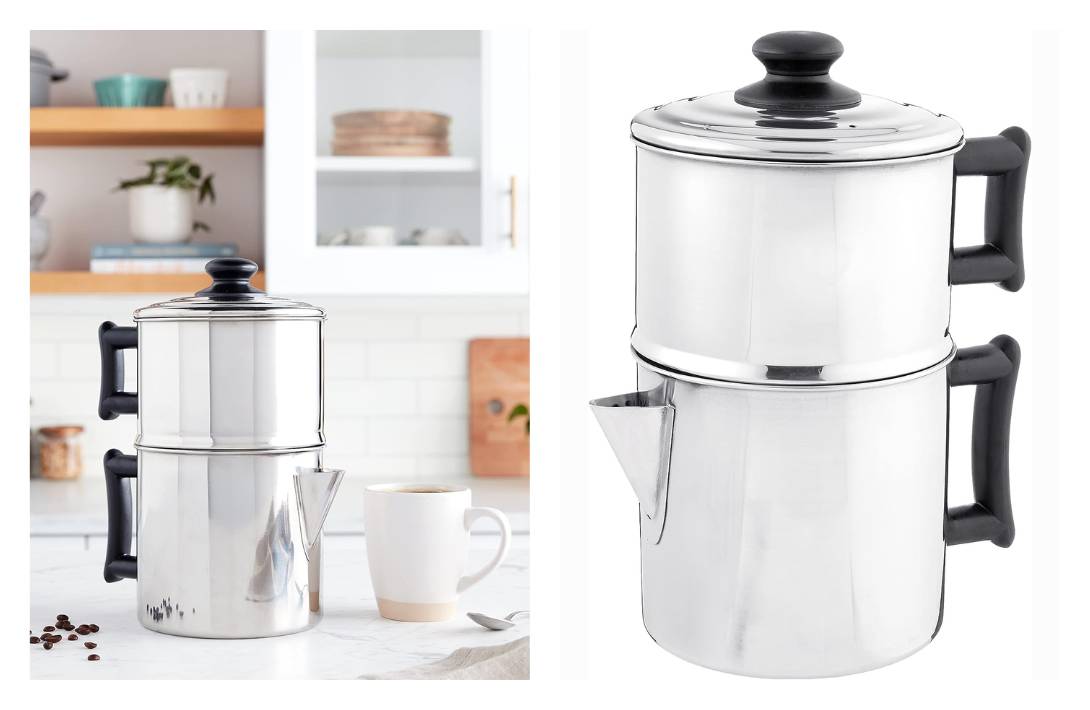
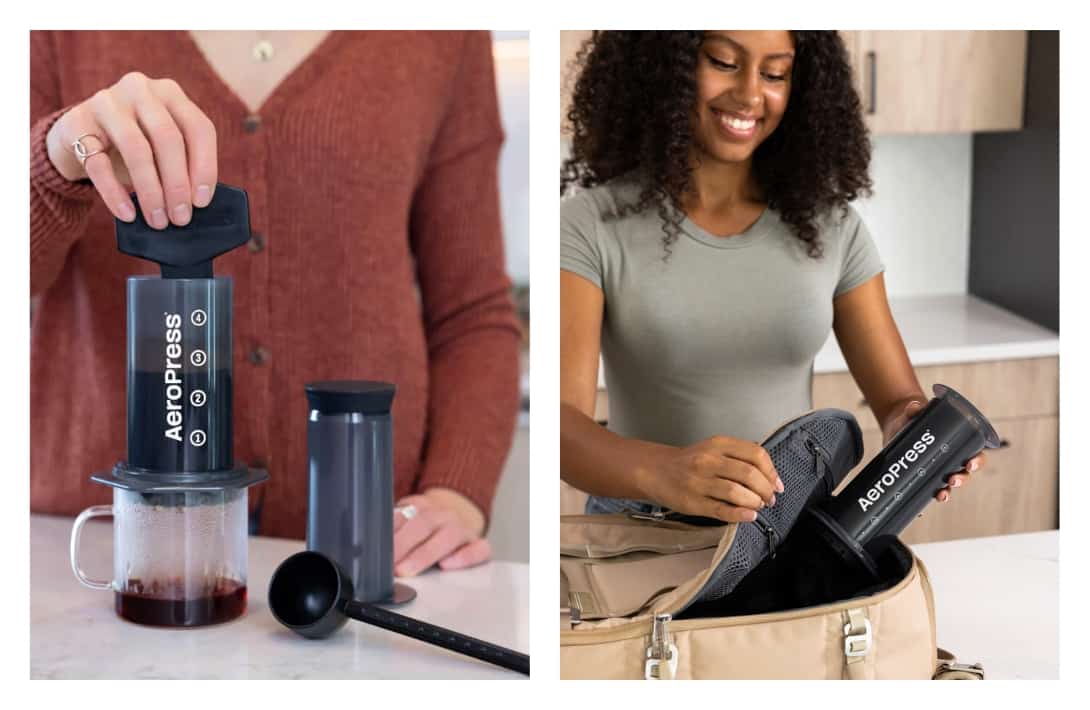
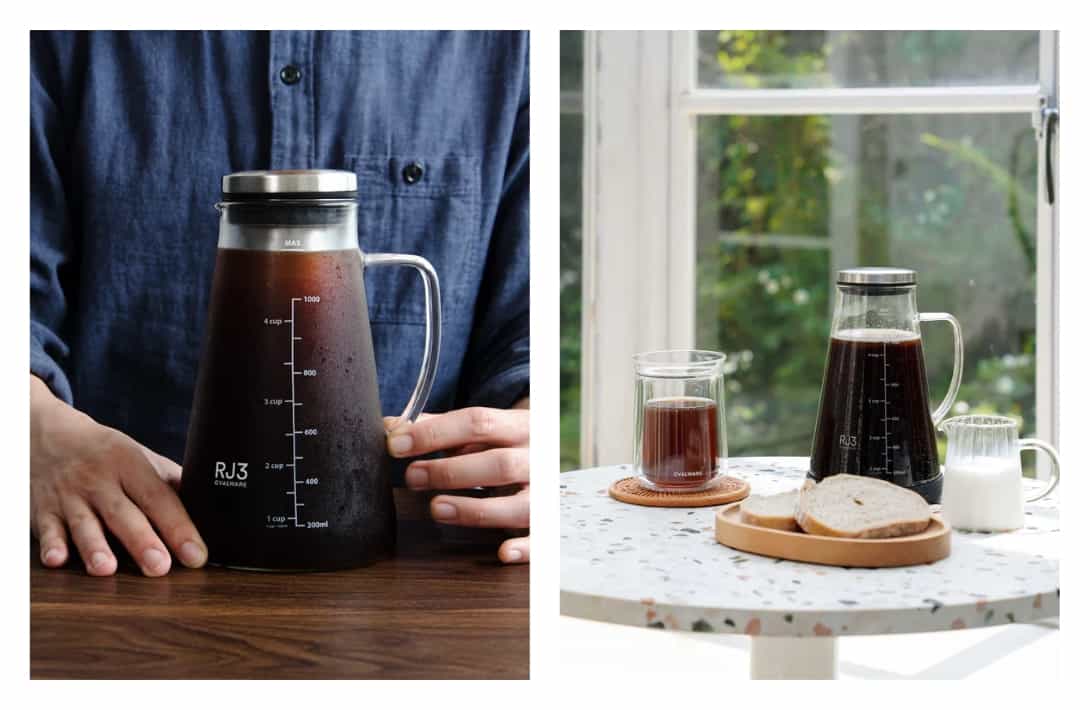
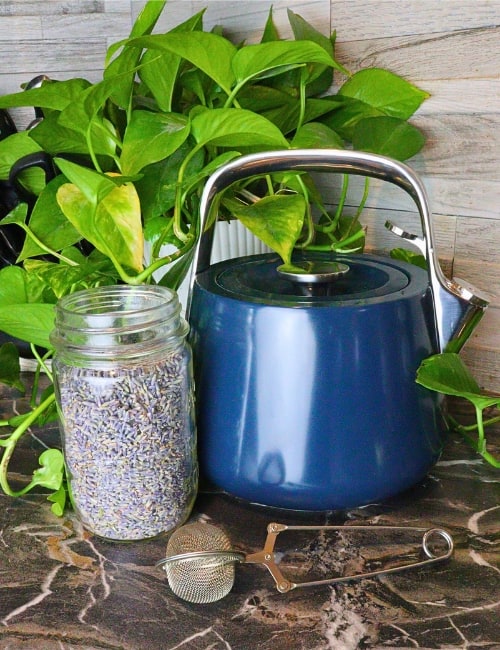
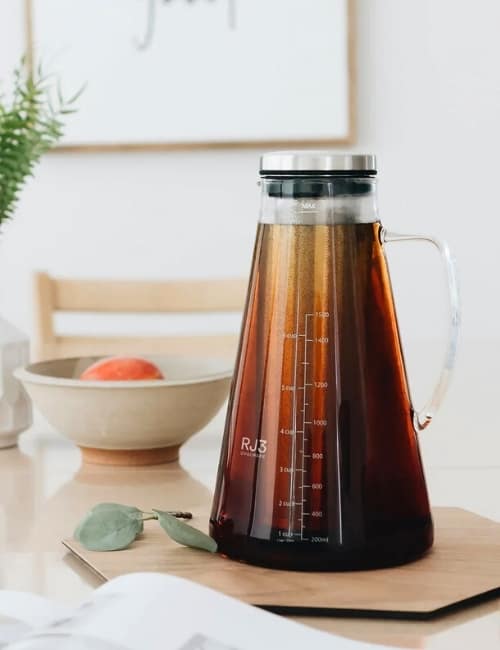
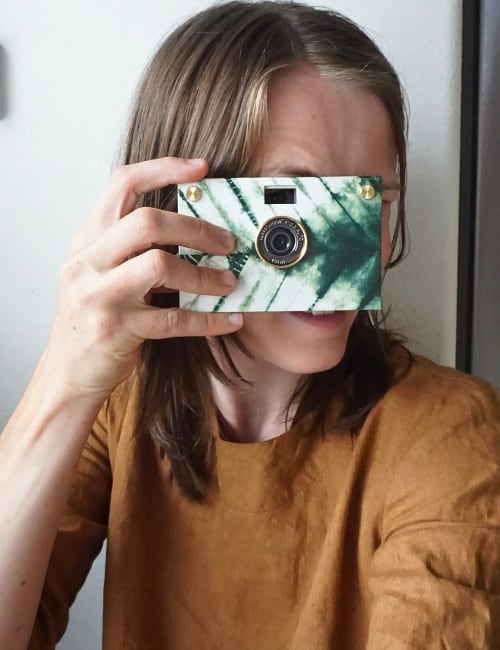
Have you managed to find a mill frother without plastic parts? Or with parts that are certified BPA, BPS and BPF free?
Hi Andrea, no I can’t say we have. Will keep an eye out!
The OXO does not have a glass water tank. I purchased because of this article, and now I will be returning.
Hi Cameron, sorry to hear but thanks for the feedback. We have removed OXO.
Hallo, please is there a coffe maker/maschine without plastic or aluminium parts?
Thank you!
Hi Ana, there’s a whole lot on this list that have no plastic or aluminum. There are several coffee makers that are entirely stainless steel for example. But if you’re after an electrical zero waste coffee maker, it can be a little trickier, although those on this list get pretty close.